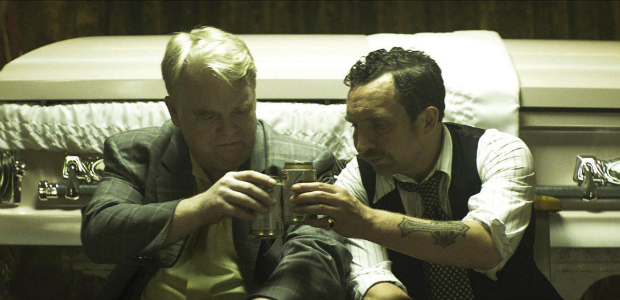God’s Pocket
We didn’t know how precious Philip Seymour Hoffman films were until they became profoundly finite.
Plot summary
When Mickey's crazy stepson Leon is killed in a construction 'accident', nobody is sorry he's gone. Mickey tries to bury the bad news with the body, but when the boy's mother demands the truth, and a local reporter starts sniffing around, Mickey finds his problems starting to stack up: a body he can’t bury, a wife he can’t please and a debt he can’t pay.

Mickey Scarpato (Philip Seymour Hoffman) owns a refrigerated truck, has a hot wife with a teenage son from another marriage, and makes his way—like everyone else in this shitty little neighbourhood in South Philly—by scrounging, stealing, betting, and drinking. His wife, Jeanie (Christina Hendricks), is resigned to the point of comatosity, and is blind to the utter uselessness of her son, Leon (Caleb Landry Jones), a stringy, razor-wielding, pill-popping, puffed up, psychotic douche bag, who deserves nothing more than an iron pipe across the back of his skull. When that happens, at work on a construction site, and he’s killed, Mickey and his pal, Bird (John Turturro) must find some way to get money together—usually stupid and illegal ways—to pay for the ostentatious casket (mahogany, with ‘champagne’ interior: $6000) Jeanie and her sisters (a flock of harpies) insist on, while Jeanie smoulders over her belief that, despite what was told to the police, it wasn’t an accident. Meanwhile, wandering in and out of the film is a jaded, unrealistically functioning alcoholic columnist, Richard Shellburn (Richard Jenkins).
God’s Pocket, the directorial debut of veteran TV character actor John Slattery (Mad Men, Desperate Housewives) belongs to a certain demi-genre of films about working class American neighborhoods—City Island (Raymond De Felitta, 2009) or Crossing Delancey (Joan Micklin Silver, 1988) or Alphabet City (Amos Poe, 1984)—that fetishize gritty urban enclaves as ‘authentic,’ viz. the slow tilt reveal here of the funeral home to show the missing letters of the signage; isn’t it all so quaint, so what we’d like to think of as really how poor people live? Simple, scruffy folk, as insular as Arkansas hillbillies. As we’re force-fed in the opening narration, this is a place where everyone’s ‘stolen something, set fires, cheated at cards, slapped kids’ and are ‘dirty-faced, uneducated, neat as pins inside’—not even sure what that means; surely dishonestly and child abuse are flaws deeper than hygiene—and ‘argue about things they don’t understand like religion and politics, and die like everyone else—there’s a dignity in that.’ No, not really. There’s a condescension in that. And a hagiologization of lovable blue collar rogues who regularly punch each other in face, only to have a beer afterwards. It assumes the kind of street-wise pose of Equity-waiver actors who want to be De Niro, and say things like ‘fuggedaboutit’ when they’re actually from Akron. It’s like tough guy play-acting.
But, surprisingly, this isn’t a film about a family, or a community, or of bonding together over loss. Not really. Or a revenge story, or a detective story, though it seems at times like it might be those things. It’s a black comedy, I think. But not really. With the score sounding like sleazoid-noir acid-lounge music and filmed with an aversion to fill lighting in a palette of dust and mould, it doesn’t look like a comedy (even with the corpse slapstick and comedic shootings) and it doesn’t sound like a drama. Insouciant with regard to narrative, subplots and relationships burst forth brightly and quickly disappear, like Higgs boson particles. Why was Richard Jenkins’s alcoholic columnist there (except to give us some fruity narration in the beginning)? And why was the stuttering witness, the lone man balking at telling lies to the police, given such portentous reaction time? A stuttering witness? That’s a nuclear reactor of movie plot mechanics, like a tenacious mother’s feeling that her son was not killed by accident and will stop at nothing to get to the bottom of it. Only here she does stop, or the filmmakers stop, at any case.
Of course, who cares? Who cares about any of all that? It’s about Philip Seymour Hoffman. Like Heath Ledger films after he was gone, Hoffman films will continue to trickle out, and we will greedily and mournfully await and consume, like the last air pocket in a slowing sinking ship, or watching that last West African Black Rhino’s troubled pregnancy; we didn’t know how precious they were until they became profoundly finite. This was a fine and sturdy Philip Seymour Hoffman role, but the film is not a landmark of his career, like Synecdoche, New York or Magnolia or Before the Devil Knows You’re Dead. Not his fault.











COMMENTS